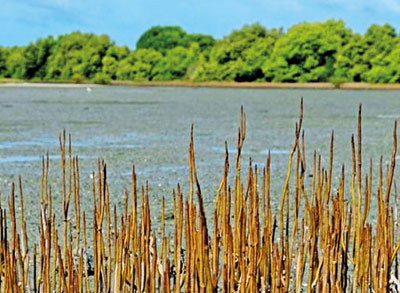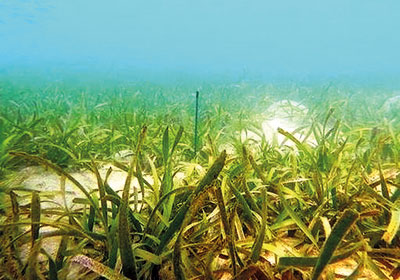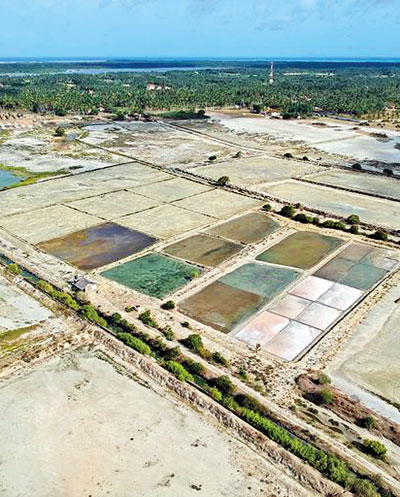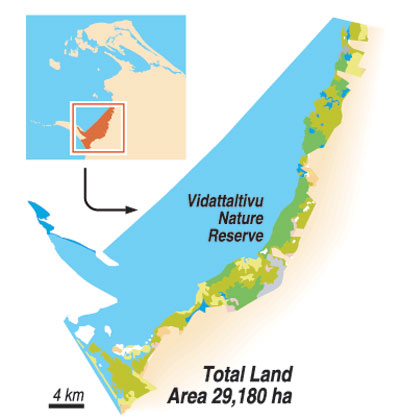News
Destructive fishery farm in sanctuary endangers marine ecosystems
View(s):By Yoshitha Perera
An industrial scale area proposed in the Vidattaltivu Nature Reserve for farming fish, crab and exotic shrimp will not go ahead if an environmental assessment by the Wildlife Conservation Department (DWC) determines it is not suitable, a senior official from the National Aquaculture Development Authority (NACDA) said.

Vidattaltivu Nature Reserve: Home to many endemic animals as well as extensive areas of seagrass meadows, mangroves, and a special coral reef known as the Maldiva Bank
The NACDA had requested from the DWC, 169 hectares in the nature reserve in Mannar for a large-scale aquaculture project. This was initiated in January, 2016 during the ‘Yahapalana’ Government of then President Maithripala Sirisena and Prime Minister Ranil Wickremesinghe. The DWC declared the reserve a marine protected area then.
In 2016, the NACDA requested 1,491 hectares from the DWC, but after being rejected through Strategic Environmental Assessment (SEA), the NACDA had to reconsider it and sought 169 hectares.
“Initially, we requested 1,491 hectares, but due to the requested area being a sanctuary, the department informed us through their SEA that we would not be able to proceed with the project. The plan was then rearranged to cause as little damage to the reserve as possible, and we asked the department for 169 hectares. A sandy strip and an abandoned lagoon yard make up this area,” an official representing NACDA said.
However, the NACDA has invited local investors to bid in March 2022.
“There are ten investors who have submitted bids and the selection process is happening. They must carry out this project in accordance with the technical guidelines we provide,” the senior official of NACDA said.
He said the Government does not care whether the investors are local or foreign. Investors should have aquaculture experience, the project should not harm the environment, and investors must have the technical and the financial ability.

Seagrass beds found in the area
The Government’s goal at first was to bring in US$1.3 billion by 2020.
The DWC had appointed a technical committee to study the impact of the proposed project and the panel had rejected the idea.
Aquaculture has been acknowledged for its contribution to global food security, but it must be done in a sustainable way. To achieve sustainable and equitable outcomes, transformative changes in policy, natural resource management, investment, innovation, and environmental considerations are required.
The nature reserve is a one-of-a-kind area designated as a marine protected area by the DWC in 2016. This area is home to many endemic animals as well as extensive areas of seagrass meadows, mangroves, and a special coral reef known as the Maldiva Bank.
This is the third largest marine protected area which covers 29,180 hectares and is close to Vankalai Sanctuary. The existing mangrove forest, lagoon, Indian Ocean, and coral reefs provide invaluable resources on which the coastal community members in the area village rely.

A large-scale aquaculture projectwas initiated in January, 2016
Environmentalists are concerned.
A group representing the Environmental Foundation Limited, the Federation of Environmental Organisations, the Lanka Environmental Fund, Lanka Nature Conservationists, the Parrotfish Collective, the Pearl Protectors and the Wildlife Nature Protection Society recently hosted a conference to express their displeasure.
Following the war against terrorism, the Government formed a special committee to monitor sensitive environmental habitats and species in the North and Eastern Provinces.
Samantha Gunasekara, former deputy director of Customs, said the SEA had identified Vidattaltivu as a sensitive environmental habitat.
“However, NACDA, in collaboration with other private organisations, intends to de-gazette a portion of this sensitive nature reserve to cultivate exotic shrimp, mud crab, tilapia, and other species without regard for the area’s environmental value,” Mr. Gunasekara said.
Sri Lanka has made commitments to the international community regarding conservation of forests and reserves. Sri Lanka has also signed the Ramsar Convention on Wetlands of International Importance and has been designated as a Commonwealth Blue Charter country for mangrove ecosystems.
The importance of seagrass and sea salt plants in the area was also explained by Susantha Udagedara, managing director of Blue Resources Trust. “Exporting seagrass and sea salt plants is a source of revenue for the country. The nature reserve is a major breeding ground for these plants. If this park is established, there will be obvious harm to these natural resources.’’
According to Muditha Katuwawala, the co-ordinator of the Pearl Protectors, the proposed farms will also cultivate an exotic species known as the king prawn (Litopenaeus vannamei), and is also known to carry a variety of diseases, including black gill disease.
There is a long history of prawn farm collapses and abandonment in Sri Lanka due to diseases.
The environmentalists explained that there is a real risk that these diseases from the ponds will be transmitted to wild shellfish populations, contributing to the collapse of indigenous populations and the loss of the artisanal fishery.

The best way to say that you found the home of your dreams is by finding it on Hitad.lk. We have listings for apartments for sale or rent in Sri Lanka, no matter what locale you're looking for! Whether you live in Colombo, Galle, Kandy, Matara, Jaffna and more - we've got them all!

